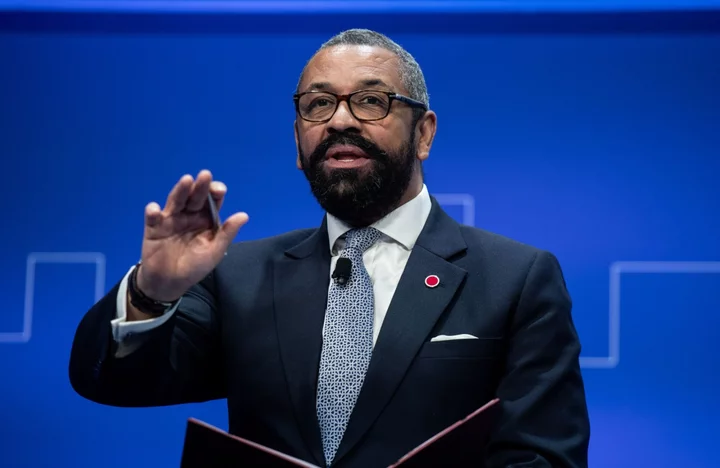It may be now or never for the UK to repair its battered relationship with the world’s second-largest economy.
Foreign Secretary James Cleverly arrived in China on Wednesday, a person familiar with the matter said, the most senior British diplomatic visitor in six years. In that time, ties between the nations have been strained by everything from the crackdown on democracy activists in Hong Kong to the Covid-19 pandemic and a succession of crises between Washington and Beijing.
Now, with the Biden administration mending ties with China, the UK has a window for rapprochement. Cleverly’s trip shows Prime Minister Rishi Sunak wants to slip through before the opening closes, despite pressure from both his own Conservatives and the Labour opposition to take a harder line on China ahead of a general election expected next year.
“The guardrails around national security have been set by US, by UK and by Chinese governments, and that’s entirely understandable,” Chris Torrens, vice chairman of the British Chamber of Commerce in China, told Bloomberg Television on Wednesday. “But at least now we’ve got a little more space for communication, so we can move commercial engagement forward. So we’re hoping that the visit by Foreign Secretary Cleverly will help to advance that.”
An improvement in economic ties would offer both countries some relief as they look to boost their sluggish economies. China was the UK’s second-largest individual trading partner last year after the US, with $132.3 billion of two-way commerce.
Beijing is seeking to shore up confidence among foreign investors wary of regulatory shakeups, simmering tensions with the West and the Communist Party’s opaque politics. Chinese officials urged Tony Blair-era UK Trade Secretary Peter Mandelson during a recent visit to advocate for overseas businesses to return or expand.
The UK is trying to demonstrate its commitment to the Asia-Pacific region before Sunak’s expected attendance at the Group of 20 summit next month in New Delhi, people familiar with the matter said. Cleverly’s trip to Beijing is focused on security matters, including concerns about potential weapon supplies to aid Russia’s war in Ukraine, the people said.
Cleverly will meet with his Chinese counterpart, Wang Yi, and with Vice President Han Zheng, his office said on Tuesday in a statement. Cleverly won’t shy away from raising China’s human rights records in Xinjiang and Tibet, and plans to raise “the erosion of autonomy, rights and freedoms in Hong Kong,” it said.
Cleverly laid out a nuanced approached to Beijing in an April speech in which he said that the West needed China to address major problems like climate change and rejected calls to “declare some kind of new Cold War.” “To give up on dialog with China would be to give up on addressing humanity’s greatest problems,” Cleverly said at the time.
That echoes the sentiments of Biden’s commerce secretary, Gina Raimondo, who said during a visit to Beijing on Monday that it was “profoundly important” for the US and China to have a stable economic relationship.
A successful visit could set the stage for the first one-on-one meeting between Sunak and Chinese President Xi Jinping at the G-20. A planned meeting in Bali last year was derailed by a news of a missile strike near Poland’s border with Ukraine and the British premier remains the only Group of Seven leader who hasn’t had a face-to-face with Xi since China lifted its Covid curbs.
“The UK could gain significant economic opportunity and diplomatic capital if it could position itself as a key US ally that also acts as a critical outlet for mediating the challenges of the US-China relationship,” said Scott Singer, co-founder of the Oxford China Policy Lab. “In an ideal scenario, this visit could be a first step toward realizing that ambitious goal.”
Still, expectations for announcements are low. President Joe Biden’s detentes with Xi have repeatedly unraveled, most recently after the US shot down a Chinese observation balloon that drifted over sensitive American military sites. Cleverly’s own trip was delayed after China’s foreign minister mysteriously disappeared from public and got replaced.
Strategy Needed
Tensions between London and Beijing continue to simmer, with Hong Kong in July putting HK$1,000,000 ($127,000) bounties on eight fugitive activists living in exile, including some in the UK. China earlier this month accused the British government of failing to meet its diplomatic obligations after a plan to relocate its embassy to an historic building in east London collapsed.
Days before Cleverly’s expected arrival, the Communist Party’s Global Times newspaper published an editorial calling on the British Museum to return colonial-era Chinese cultural relics. The newspaper called it a “test and verification of Britain’s sincerity in clearing the colonial stain and making amends for its historical sins.”
Sunak has no plans to visit Beijing, Bloomberg News reported in June, citing people familiar with the matter. That’s a contrast to other European leaders such as France’s Emmanuel Macron and German Chancellor Olaf Scholz, who have led high-profile delegations to the Chinese capital in recent months.
While the London might be a late starter to post-pandemic engagement efforts, Beijing will welcome any efforts to counter what they see as US attempts to contain China’s economic and military clout. European countries appear to be leaning on the Biden administration to tone down some of its language around de-coupling.
A shift by the White House to instead refer to “de-risking” and the limited scope of a planned executive order to curb US investment in Chinese technology suggest those attempts may be working. Earlier this month, the UK indicated it considering following Biden’s move to limit local investment in some Chinese advanced technology companies.
Britain needs “a well-conceived China strategy that identifies clearly what the UK wants in its relations with China,” said Steve Tsang, director of the China Institute at SOAS University in London. “Even with the lack of such a strategy, engage with China we must.”
--With assistance from Alex Wickham and Colum Murphy.
(Updates with Cleverly’s arrival in second paragraph.)

